March 3, 2022: IRES Student Seminar with Celeste Pomerantz and Atlanta-Marinna Grant
IRES Seminar Series
Time: 12:30pm to 1:30pm (Pacific Standard Time)
Location: AERL Theatre, Room 120 (2202 Main Mall)
Note: This seminar was recorded. Please email info@ires.ubc.ca to request the video link.
*********************************************************************************************************************************
Decarbonizing Canada’s Remote and Off-Grid Communities: Assessing the feasibility of Implementing Energy Storage Technologies to Reduce Fossil Fuel Dependency
Abstract:
Canada’s remote communities are heavily reliant on fossil fuels as their primary power source. Multiple challenges associated with the use of fossil fuels to power these communities such as a lack of year-round road access, increasing costs of fossil fuels, and the rising variability of unpredictable weather patterns has resulted in energy insecurity. Several renewable energy projects have been considered by the government of Canada and the provincial governments to aid communities with the reduction of diesel consumption and provide energy independence. Few of these initiatives consider energy storage as a viable option. Energy storage technologies store excess generated electricity from renewables during times of low demand and deploy stored energy during times of high demand or low generation. This research seeks to analyze multiple energy storage technologies to determine which will be the most feasible solution for implementation within Canadian remote communities to reduce fossil fuel reliance and provide potential long term cost savings.
Celeste Pomerantz

MSc Student
Bio:
From Food ‘Waste’ to Food ‘Cycle’: biocultural heritage and the sharing of oral histories for secure and sovereign communities.
Abstract:
My research aims to incorporate interdisciplinary approaches in the realm of Indigenous food sovereignty, governance, bicultural heritage and the preservation of Indigenous knowledge through oral histories and storytelling. More specifically, my work addresses the barriers towards reclaiming culture and accessing one’s bicultural heritage through the collection of food cycling (waste) practices and Indigenous food-related histories. Here, food cycling can be thought of as a life cycle, a circular food system, in which full utilization of the food product is considered, where chosen certain parts are eaten, and those uneaten are placed back into the land or repurposed with thoughtful and careful consideration. While my research will highlight food ‘cycling’ it also will hold the space for all other food-related oral histories. I strongly believe that food cycling (e.g., bone burial, full utilization hunting practices) can provide sacred teachings around how to ensure remote communities can practice their knowledge and create infrastructures that will allow for cultural-safe food security initiatives that are stronger than current agro-technology centered projects or any other food security spaces that do not acknowledge the protection and consultation of Indigenous knowledge. The non-relational mindset of our industrial food system hinders these forms of knowledge(s) and the potential behaviors that may follow. For Indigenous communities, our knowledge must be protected, through this cross-culture and collaborative research, food ‘cycling’, as well as food oral histories and knowledge, promote Indigenous food-governance from the communities it originates and preserve this sacred knowledge(s) and practices for the communities’ generational passing.
Atlanta-Marinna Grant
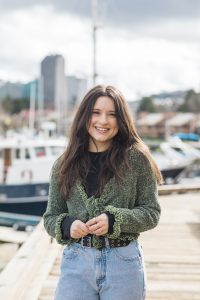
MA Student
Bio:
March 17, 2022: IRES Student Seminar with Georgia Green and Justin Huynh
IRES Seminar Series
Time: 12:30pm to 1:30pm (Pacific Standard Time)
Location: AERL Theatre, Room 120 (2202 Main Mall)
View Zoom Video.
*********************************************************************************************************************************
Characterizing Diverging Scientific Perspectives of Relevance for Chemicals Management
Abstract:
The risks hormone disrupting substances pose to human health are highly uncertain and it is therefore a research area defined by controversy and expert disagreement. There is reason to believe that these disagreements, to some extent, are rooted in diverging scientific styles of reasoning. Making these areas of expert disagreement clearer can help identify if relevant perspectives are being excluded in chemicals management policy. This study trials a new methodological approach to systematically characterise diverging scientific styles of reasoning in endocrine disruptor literature, combining bibliometrics and grounded theory. The trialled method shows promise and the initial findings suggest that there are distinct ways of reasoning about the validity and purpose of different methods, policy alternatives, endocrine disruptor definition and treatment of uncertainty.
Note: For questions for Georgia’s talk:
A) If you are on zoom, please type your question in the chat.
B) If you are in AERL Theatre, please:
- Bring your phone or laptop
- Go to menti.com and enter the code shown on the presentation slides
- Type in your question
Georgia Green
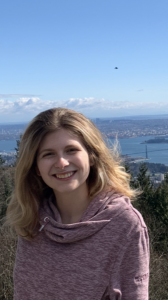
MSc Student
Bio:
Predicting the Impact of Minerals for a Low-Carbon Energy Transition
Abstract:
Production of low-carbon technologies such as solar PV, wind turbines, and electric vehicle batteries is more mineral intensive than that of fossil fuel technologies. Given that a large-scale low-carbon energy transition is proposed as a necessary step toward climate change mitigation, mining impacts could be exacerbated by increased demand for certain minerals. There is a contentious relationship between extractive industries and Indigenous communities in Canada, so it is important to consider the impact the low-carbon energy transition could have on Indigenous communities. This research will use remotely sensed imagery to develop a model that can relate various parameters of mineral extraction to the spatial extent of a mine’s impact. These impacts will then be interpreted through the context of Canadian settler-colonialism to consider the externalities of a low-carbon future where settler-colonialism remains.
Justin Huynh
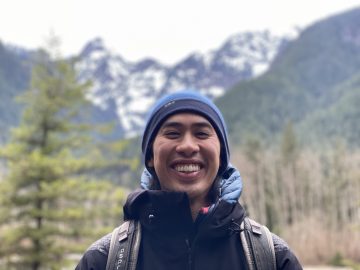
MSc Student
Bio:
March 24, 2022: IRES Faculty Seminar with Danielle Ignace
IRES Seminar Series
Time: 12:30pm to 1:30pm (Pacific Standard Time)
Location: AERL Theatre, Room 120 (2202 Main Mall)
View Zoom Video.
*********************************************************************************************************************************
Broadening our approach to find community-driven solutions to environmental challenges
Abstract:
Communities are facing ever-growing socio-ecological challenges due to the devastating impacts of pollution and climate change. Solving such complex environmental challenges will require new partnerships, connections, and collaborations that bring together many forms of knowledge, perspectives, and ways of communicating. We are at a unique moment where we can reimagine how science and scientists connect with society and the environment while re-centering the voices of knowledge holders from marginalized communities. Going beyond the peer-review publications and moving to include many forms of writings, knowledge sharing, artwork, and communication will be needed to find community-driven solutions to environmental problems.
Danielle Ignace
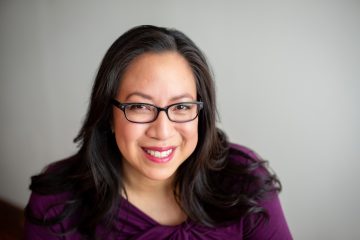
Assistant Professor, UBC Department of Forest and Conservation Sciences
Bio:
Dr. Danielle Ignace is a member of the Coeur d’Alene tribe, an ecophysiologist, and science communication enthusiast. She is an Assistant Professor in the Department of Forest and Conservation Sciences at UBC. She studies how climate change and species invasions impact forest ecosystem health and Indigenous communities. Dr. Ignace is a Research Associate at Harvard Forest, Associate Editor for the journal Elementa: Science of the Anthropocene, and is a Science for Social Equity Fellow (of Fair Count) finding community-driven solutions to climate change and pollution. As a member of the Diversity, Equity, and Inclusion Committee for the American Society of Plant Biology and as an Indigenous woman in STEM, she is deeply committed to developing Indigenous curriculum and her unique perspective bridges Indigenous communities, people of color, and scientists.
April 7, 2022: IRES Professional Development Seminar with Andrea Reimer
IRES Seminar Series
Time: 12:30pm to 1:30pm (Pacific Standard Time)
Location: AERL Theatre, Room 120 (2202 Main Mall)
OR via Zoom:
********************************************************************************************************************************
Note: This seminar will not be recorded.
*********************************************************************************************************************************
Abstract:
How many times have you seen great ideas take much longer to come to fruition than they needed to, or even fail altogether, because people or politics got in the way? Power informs the way we take up space and whether or not we leave room for others. How we unconsciously accept the way the playing field is tilted and cede ground to other people also reinforces power structures.
It doesn’t have to be this way: power literacy and competency are skills like any other that can be learned and perfected. Power Fundamentals is a foundational session to give participants a common language for power and the building blocks for a greater understanding of their own power and the power of others, as well as the tools for basic power mapping to assist advocacy and policy-making.
Andrea Reimer
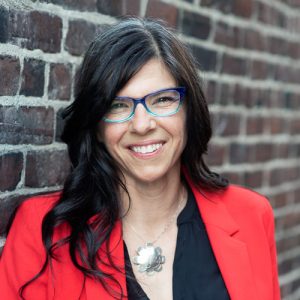
Bio:
April 14, 2022: IRES Student Symposium
IRES Seminar Series
Time: 12:30pm to 2:30pm (Pacific Standard Time)
Location: AERL Theatre, Room 120 (2202 Main Mall)
View Zoom Video.
*********************************************************************************************************************************
Order of Presenters:
Prerna Gupta – 12:30pm to 1pm
Emma Gillies – 1pm to 1:30pm
15 Minute Break – 1:30pm to 1:45pm
Brynley Hanson-Wright – 1:45pm to 2:15pm
*********************************************************************************************************************************
Exploring the environmental drivers of methylmercury bioaccumulation in the Beaufort Sea
Abstract: Mercury entering aquatic systems can be transformed into methylmercury, a strong neurotoxicant that builds up in organisms and affects animal and public health. In the Arctic’s Beaufort Sea, top predators such as beluga whales—an ecologically and culturally significant species for many Inuit communities—can contain high concentrations of methylmercury. Historical methylmercury concentrations in Beaufort Sea belugas cannot be explained by mercury emissions trends alone, and environmental changes such as sea ice melt have been proposed as potential drivers of methylmercury concentrations in the ecosystem. Here, I explore the main drivers of methylmercury bioaccumulation in various species in the Beaufort Sea food web using an ecosystem modelling software and scenarios of environmental change informed by both Western Science and Inuvialuit Knowledge. This research seeks to identify drivers of mercury variability, highlight knowledge gaps, and make space for different ways of knowing.
Emma Gillies
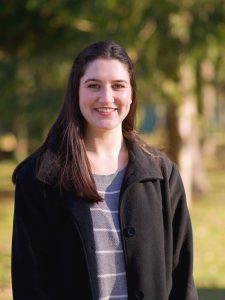
MSc Student
Bio:
Boosting understanding of lifestyle carbon emissions: Evaluating the effectiveness of personal carbon calculators to promote climate action
Abstract: Climate change is driven in part by the lifestyle choices individuals make every day and yet the emissions associated with these decisions are seldom considered and are challenging for people to conceptualize. My research investigates different ways we can make these emissions more salient and enable individuals to make climate-friendly choices. Personal carbon calculators offer a unique opportunity to provide individuals with information about the climate-cost of different actions alongside personalized guidance for lowering one’s own impact. My research uses online between-subject experiments to evaluate how effective such tools may be for promoting climate action (e.g., personal emission-reducing behaviours, civic actions, and carbon offsetting). Though information provision alone is of course insufficient to address the climate crisis, my findings indicate that boosting knowledge about greenhouse gas emissions may empower individuals to reduce their personal emissions in the immediate future.
Brynley Hanson-Wright
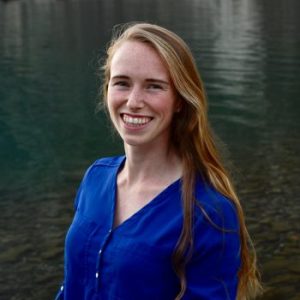
MSc Student
Bio:
March 31, 2022: IRES Faculty Seminar with Naomi Zimmerman
IRES Seminar Series
Time: 12:30pm to 1:30pm (Pacific Standard Time)
Location: AERL Theatre, Room 120 (2202 Main Mall)
View Zoom Video.
*********************************************************************************************************************************
Understanding air quality with lower-cost sensors: technical and community considerations for impactful research
Abstract:
Increasingly, lower-cost air pollution sensors are being used by academics, government agencies and community organizations to understand local patterns of air quality and the impacts of sources such as traffic and wildfires. Given that this research typically happens in community settings (e.g., campus or community as a ‘living lab’), there are a number of important technical and community considerations that must be addressed. These considerations can range from sensor siting, to stakeholder relationship building, to data reporting and more. In this talk, I will go over some recent lower-cost sensor research studies in Metro Vancouver and explore the air quality science outcomes, as well as provide insights into how these kinds of studies are designed and executed for maximum impact.
Naomi Zimmerman
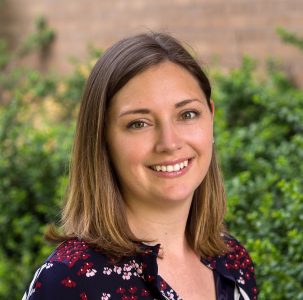
Assistant Professor, Department of Mechanical Engineering, University of British Columbia
Canada Research Chair in Sustainability
Bio:
Dr. Naomi Zimmerman is an Assistant Professor in the Mechanical Engineering at UBC and Canada Research Chair in Sustainability. Prior to UBC she was a postdoctoral fellow at the Center for Atmospheric Particle Studies at Carnegie Mellon University and also holds a Ph.D. in Chemical Engineering from the University of Toronto. Her research focuses on the measurement of air pollutants in complex environments to better understand the health and climate impacts of new technologies and policies, with a focus on the transportation and energy sectors. Dr. Zimmerman is also a lead investigator of the Rapid Air Improvement Network (RAIN).
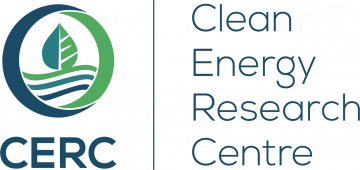
This seminar is co-sponsored by UBC Clean Energy Research Centre and UBC IRES.
